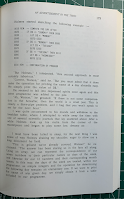
Have you always wanted to learn BASIC? No? Well, would you want to learn BASIC if it were taught by Sherlock Holmes? If so, we have just the book for you!
BASIC, the programming language invented at Dartmouth in the 1960s, revolutionized computing by making it easy for beginners to pick up programming for school, work, or fun. Over the following decades, methods of learning BASIC were in high demand, including at least one creative textbook. Elementary BASIC, by Henry Ledgard and Andrew Singer, resembles a typical Sherlock Holmes book, with a key difference: Sherlock is using BASIC to solve the crime. He explains it to Watson as he goes, giving examples in both BASIC and pseudo-code, such as this one for a conditional loop:
get another clue
examine the clue
until MURDERER ≠ UNKNOWN
While it may seem silly, the book covers a lot of important programming concepts. It could even be useful today if BASIC were replaced with a more modern programming language, though Elementary Python doesn't have the same ring to it.
Now that you’ve been convinced to learn BASIC, come to Rauner and ask for MS-1144 Box 10, Thomas Kurtz’s collection of BASIC texts from around the world. On June 28th, we'll also be opening our summer exhibit on the Dartmouth Time-Sharing System, which BASIC was created for.

No comments :
Post a Comment